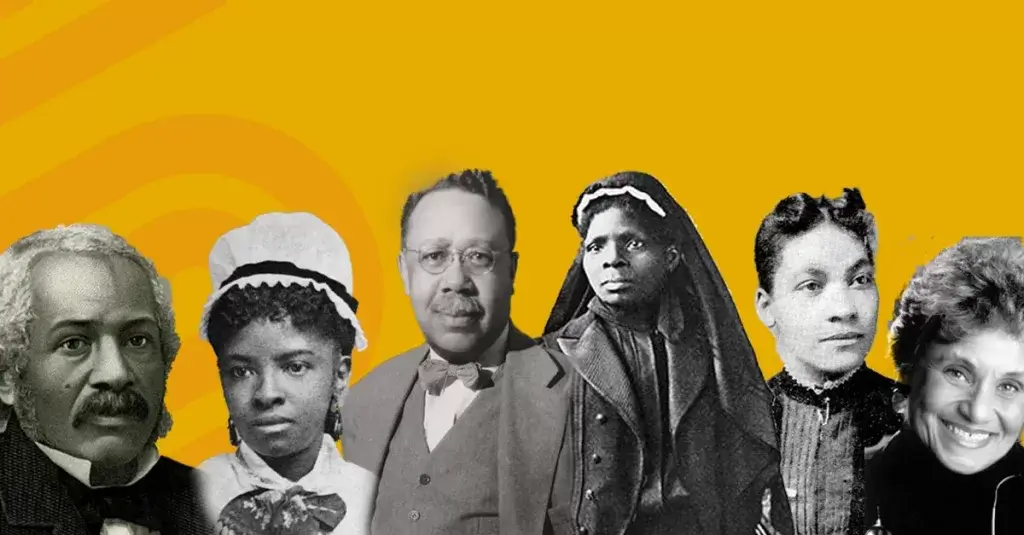Medical history is a long and complicated road, often filled with both uncomfortable facts and inspiring stories of achievement. With all this history, too often we lose sight of the incredible and long-lasting impacts that African Americans have had in the medical field from the beginning. We wanted to highlight a few of those brilliant figures in this article and do our part in celebrating those unsung heroes and pioneers this Black History Month.

Susie King Taylor
Susie King Taylor was the first African American nurse in the American Civil War, treating the Union wounded in the 1st South Carolina Volunteer Infantry Regiment. After her time treating the casualties of war, she published an unflinching memoir of what she saw during the war and became the first black woman to publish their memoirs. Her sense of duty to those who needed help and care continued as she founded schools for the formerly enslaved when other institutions were closed to them. Later in life, she founded the 67 Corps of the Women’s Relief Corps, a veteran’s care charitable organization, to care for wounded Union veterans being ignored by their government and, often, society at large. She lived a life that proved the value of care to the forgotten, downtrodden, and ignored.

Mary Eliza Mahoney
Mary Eliza Mahoney was the first African American to graduate from nursing school in the United States and tirelessly advocated for Black nurses and their living standards. The field was dominated by white nurses and burdened by discrimination both legal and cultural, and at the time, the Nurses Associated Alumnae of the United States and Canada (which later became the ANA) didn’t accept Black nurses, even though Mary was one of their first members. That led to her co-founding the National Association of Colored Graduate Nurses specifically to represent the growing number of Black nurses around the country. Many years after her death, in the 1950s, both organizations merged because of the acceptance and prevalence of Black nurses in American society. A tireless proponent of civil rights and women’s suffrage, she was one of the first women to register to vote in Boston, which in and of itself was a brave and radical act. Her legacy of advocacy, professionalism, and respect changed the nursing field for the better, and we still benefit today.

James McCune Smith
James McCune Smith was the first African American to hold a medical degree from an official institution, which he earned from The University of Glasgow in Scotland nearly thirty years before the abolition of slavery in the United States. That would seem to be achievement enough for any lifetime, but his ability to break barriers while helping those who remained trapped in the bonds of slavery never faltered. He then became the first Black pharmacist with his own pharmacy, provided aid to those escaping bondage through the Underground Railroad, resisted the Fugitive Slave Law along with the Committee of Thirteen in Manhattan, and spent nearly two decades as the sole physician at the Colored Orphan Asylum caring for the children there. All of this was done before the end of the Civil War, and unfortunately, he died three weeks before the passage of the Thirteenth Amendment. Despite living in a time that was hostile to his life, success, and happiness, he was able to build a legacy that helped the generations that followed him.

William Augustus Hinton
William Augustus Hinton was an accomplished pathologist, bacteriologist, and the first Black professor at Harvard. At a time when diagnosing disease was often no different than just making a wild guess, he developed the first accurate test for syphilis. This allowed for better treatment, prevention, and identification of a brutal and hard-to-track disease when that ability was a very rare thing. The test was adopted by the United States Public Health Service and eased the treatment of the disease, which was not a pleasant process at the time. While at Harvard, he was admitted to the American Society of Microbiology, becoming their first Black member – which they may not have known at the time, since he never attended any meetings for fear of racist attitudes hurting the valuable work he was doing. Later, he founded a school that instructed women in being a lab technician, which expanded the field massively.

Marilyn Gaston
Marilyn Gaston is a physician who, while an intern at Philadelphia General Hospital, began to develop screening procedures for sickle cell disease in infants that has saved thousands of lives. By screening shortly after birth, treatments can be started that would prevent the infants from developing sepsis around four months old. This not only saved lives, but improved the quality of life that someone diagnosed with the disease would experience later in life. Congress soon enacted healthcare legislation that mandated screenings for sickle cell disease based on the impact of her work. She later went on to be the first Black Woman in charge of the Bureau of Primary Health Care in the Health Resources and Services Administration and continues to be an advocate in the healthcare community.

Rebecca Lee Crumpler
Rebecca Lee Crumpler was the first African American woman to become a medical doctor in the United States – just one year before the end of the Civil War. She published a medical textbook, A Book of Medical Discourses, that focused on infant care for mothers, nurses, and caretakers. This makes her the first Black woman to publish a medical text and led to increased knowledge of pediatric care and prevention around the country. She went to work for the Freedmen’s Bureau, focusing on treating and caring for formerly enslaved people who were denied care by white physicians. Though she faced intense racism, sexism, and a system that did all it could to stop her in her tracks, she dedicated her life to helping women, children, and those who were most in need.
These six trail-blazing African American pioneers in healthcare have changed the medical field, and all our lives, for the better. The knowledge, skills, bravery, and determination opened the medical field to people who had traditionally been cast aside by the institutions. It’s vital to recognize and honor their contributions, small and large, that helped to create what we experience today, and to drive all of us to take on that legacy to continue their work of inclusion. We’re honored to celebrate their achievements during this Black History month, and we hope to carry their inspiration with us throughout the rest of the year.





